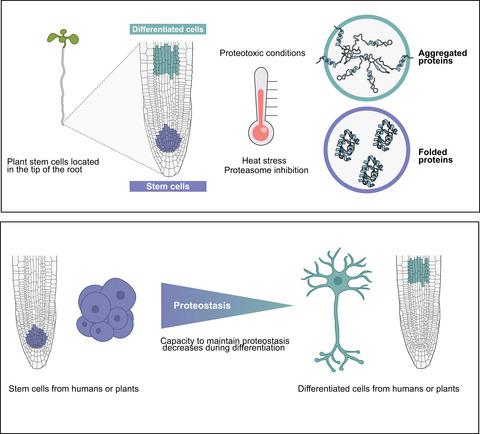当前位置:
X-MOL 学术
›
Aging Cell
›
论文详情
Our official English website, www.x-mol.net, welcomes your
feedback! (Note: you will need to create a separate account there.)
The intrinsic chaperone network of Arabidopsis stem cells confers protection against proteotoxic stress
Aging Cell ( IF 8.0 ) Pub Date : 2021-07-30 , DOI: 10.1111/acel.13446 Ernesto Llamas 1 , Salvador Torres-Montilla 2 , Hyun Ju Lee 1 , María Victoria Barja 2 , Elena Schlimgen 1 , Nick Dunken 3 , Prerana Wagle 1 , Wolfgang Werr 4 , Alga Zuccaro 3 , Manuel Rodríguez-Concepción 2, 5 , David Vilchez 1, 6, 7
Aging Cell ( IF 8.0 ) Pub Date : 2021-07-30 , DOI: 10.1111/acel.13446 Ernesto Llamas 1 , Salvador Torres-Montilla 2 , Hyun Ju Lee 1 , María Victoria Barja 2 , Elena Schlimgen 1 , Nick Dunken 3 , Prerana Wagle 1 , Wolfgang Werr 4 , Alga Zuccaro 3 , Manuel Rodríguez-Concepción 2, 5 , David Vilchez 1, 6, 7
Affiliation

|
The biological purpose of plant stem cells is to maintain themselves while providing new pools of differentiated cells that form organs and rejuvenate or replace damaged tissues. Protein homeostasis or proteostasis is required for cell function and viability. However, the link between proteostasis and plant stem cell identity remains unknown. In contrast to their differentiated counterparts, we find that root stem cells can prevent the accumulation of aggregated proteins even under proteotoxic stress conditions such as heat stress or proteasome inhibition. Notably, root stem cells exhibit enhanced expression of distinct chaperones that maintain proteome integrity. Particularly, intrinsic high levels of the T-complex protein-1 ring complex/chaperonin containing TCP1 (TRiC/CCT) complex determine stem cell maintenance and their remarkable ability to suppress protein aggregation. Overexpression of CCT8, a key activator of TRiC/CCT assembly, is sufficient to ameliorate protein aggregation in differentiated cells and confer resistance to proteotoxic stress in plants. Taken together, our results indicate that enhanced proteostasis mechanisms in stem cells could be an important requirement for plants to persist under extreme environmental conditions and reach extreme long ages. Thus, proteostasis of stem cells can provide insights to design and breed plants tolerant to environmental challenges caused by the climate change.
中文翻译:

拟南芥干细胞的内在伴侣网络提供对蛋白毒性应激的保护
植物干细胞的生物学目的是维持自身,同时提供新的分化细胞库,形成器官并恢复或替换受损组织。细胞功能和活力需要蛋白质稳态或蛋白质稳态。然而,蛋白质稳态和植物干细胞特性之间的联系仍然未知。与其分化的对应物相比,我们发现即使在蛋白质毒性应激条件下,如热应激或蛋白酶体抑制,根干细胞也可以防止聚集蛋白的积累。值得注意的是,根干细胞表现出增强的不同伴侣蛋白的表达,从而维持蛋白质组的完整性。特别,T-complex protein-1 ring complex/chaperonin containing TCP1 (TRiC/CCT) complex 的内在高水平决定了干细胞的维持及其抑制蛋白质聚集的显着能力。TRiC/CCT 组装的关键激活剂 CCT8 的过表达足以改善分化细胞中的蛋白质聚集并赋予植物对蛋白毒性应激的抗性。总之,我们的研究结果表明,增强干细胞中的蛋白质稳态机制可能是植物在极端环境条件下持续存在并达到极长年龄的重要要求。因此,干细胞的蛋白质稳态可以为设计和培育耐受气候变化引起的环境挑战的植物提供见解。足以改善分化细胞中的蛋白质聚集并赋予植物对蛋白质毒性应激的抵抗力。总之,我们的研究结果表明,增强干细胞中的蛋白质稳态机制可能是植物在极端环境条件下持续存在并达到极长年龄的重要要求。因此,干细胞的蛋白质稳态可以为设计和培育耐受气候变化引起的环境挑战的植物提供见解。足以改善分化细胞中的蛋白质聚集并赋予植物对蛋白质毒性应激的抵抗力。总之,我们的研究结果表明,增强干细胞中的蛋白质稳态机制可能是植物在极端环境条件下持续存在并达到极长年龄的重要要求。因此,干细胞的蛋白质稳态可以为设计和培育耐受气候变化引起的环境挑战的植物提供见解。
更新日期:2021-08-19
中文翻译:

拟南芥干细胞的内在伴侣网络提供对蛋白毒性应激的保护
植物干细胞的生物学目的是维持自身,同时提供新的分化细胞库,形成器官并恢复或替换受损组织。细胞功能和活力需要蛋白质稳态或蛋白质稳态。然而,蛋白质稳态和植物干细胞特性之间的联系仍然未知。与其分化的对应物相比,我们发现即使在蛋白质毒性应激条件下,如热应激或蛋白酶体抑制,根干细胞也可以防止聚集蛋白的积累。值得注意的是,根干细胞表现出增强的不同伴侣蛋白的表达,从而维持蛋白质组的完整性。特别,T-complex protein-1 ring complex/chaperonin containing TCP1 (TRiC/CCT) complex 的内在高水平决定了干细胞的维持及其抑制蛋白质聚集的显着能力。TRiC/CCT 组装的关键激活剂 CCT8 的过表达足以改善分化细胞中的蛋白质聚集并赋予植物对蛋白毒性应激的抗性。总之,我们的研究结果表明,增强干细胞中的蛋白质稳态机制可能是植物在极端环境条件下持续存在并达到极长年龄的重要要求。因此,干细胞的蛋白质稳态可以为设计和培育耐受气候变化引起的环境挑战的植物提供见解。足以改善分化细胞中的蛋白质聚集并赋予植物对蛋白质毒性应激的抵抗力。总之,我们的研究结果表明,增强干细胞中的蛋白质稳态机制可能是植物在极端环境条件下持续存在并达到极长年龄的重要要求。因此,干细胞的蛋白质稳态可以为设计和培育耐受气候变化引起的环境挑战的植物提供见解。足以改善分化细胞中的蛋白质聚集并赋予植物对蛋白质毒性应激的抵抗力。总之,我们的研究结果表明,增强干细胞中的蛋白质稳态机制可能是植物在极端环境条件下持续存在并达到极长年龄的重要要求。因此,干细胞的蛋白质稳态可以为设计和培育耐受气候变化引起的环境挑战的植物提供见解。











































 京公网安备 11010802027423号
京公网安备 11010802027423号